What (And When) Can You Drink While Doing A Modified Fast? Tips, Recipes, and Best Practices
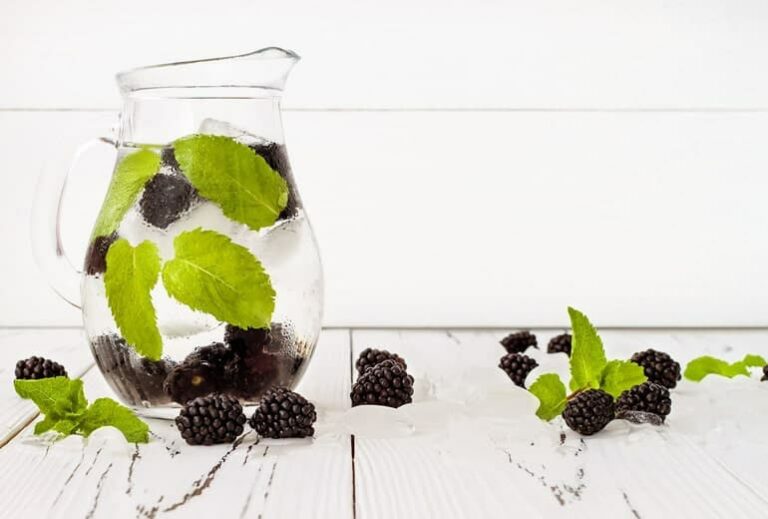
Pure, plain water might be the most important substance in the world1 — and a vital part of intermittent fasting or other modified fasts— but that doesn’t mean it isn’t boring sometimes.
Which is why I’m here to answer all your questions about what you should (and shouldn’t) drink for best results during a modified fast, in addition to plain water.
In this article:
- Why Hydration Makes Fasting Easier, Safer, and More Effective
- Choose Alkaline Water Whenever Possible
- What NOT to Drink During a Modified Fast
- Drinks that Are 100% Allowed During a Modified Fast
- Will Drinks with a Small Amount of Calories (Like Lemon Water or Celery Juice) Break My Fast?
- Symptoms of Dehydration and Low Electrolyte Levels While Fasting
- TLDR: What You Can Drink During a Modified Fast
I’ll also share a few pointers on how to stay hydrated, telltale symptoms of dehydration and electrolyte imbalance, and a few fun recipes for fasting-friendly drinks!
Why Hydration Makes Fasting Easier, Safer, and More Effective
Before we dig into what you can (and can’t) drink besides water during a fast, let’s talk about why hydration is so important. And why plain old water is still your best ally for good fasting results.
Water is so vital to good health that even a one percent deficiency2 can start to cause problems (like an imbalance in acid levels in your stomach, along with impaired kidney function).
Water allows your body to flush waste and toxins from your cells and organs (especially your colon, skin, and liver), helps your hormone levels stay balanced, and helps you maintain consistent, efficient energy production and digestion.1
During a modified fast, you need water more than ever. As your body enters a state of autophagy3 (a unique state triggered by fasting, in which your body “eats” and recycles damaged and dead cells) and begins to draw upon fat stores that are hiding toxins and heavy metals, you’ll be flushing a lot of bad stuff from your body.
So, how much plain water should you be drinking each day of a fast? The minimum amount during a fast should be equivalent to half your body weight in ounces (e.g. if you weigh 160 lbs., drink 80 oz plain water, which is 10 8-oz glasses).
[Related: Modified Fasting 101: The Ultimate Beginner’s Guide]
Choose Alkaline Water Whenever Possible
Whether you’re fasting or not, choose alkaline water (also known as ionized water) whenever you can. Our processed, chemical-laden world often leads to an overly acidic body pH, making you more vulnerable to all kinds of health problems, including liver disease, diabetes, acid reflux, and even cancer.
Alkaline water that has a pH of 8 or 9 (out of 10) can help your body balance an overly acidic pH. If the water you drink is acidic (which is the case for tap water, distilled water, and reverse osmosis water), then water molecules are “hungry,” causing them to scavenge needed electrons and minerals from tissues, teeth, and bones, to increase the pH and buffer acidity.
What NOT to Drink During a Modified Fast
First, the bad news (although is it really bad news when it’s going to make you feel so much better?).
Let’s rip this band-aid off. During your modified fast, you’re going to want to completely abstain from all of the following drinks:
1. Coffee — Yes, Even Decaf
I know this one is hard. But I promise you, the amount of energy you feel after a coffee-free fast is going to surprise and delight you. Coffee (including decaf coffee) is extremely dehydrating, highly acidic, and full of caffeine. (Decaf has less caffeine, but it's still caffeinated and very acidic.)
If you’re a heavy coffee drinker, I recommend cutting out coffee about three days before you begin your fast; this will help you avoid dealing with caffeine withdrawal symptoms on top of herxheimer reactions (cleansing reactions) as your body detoxes and enters autophagy in your modified fast.
[Related: 9 Tips For Sailing Through A 3-Day Modified Fast]
2. Anything Caffeinated
During a fast, your liver is going to be rationing out your stored glycogen carefully to help you maintain energy production. Caffeine forces the liver to dump glycogen into the bloodstream4 and acts as a stimulant. These two factors lead to a fast burst of energy and then a bigger “crash” and more intense hunger pangs during a fast, as your body scrambles to refuel the liver with glycogen stores.
3. Kombucha
While kombucha can be a probiotic and antioxidant source outside of a fast, you’ll want to abstain during a fast. Even small amounts of caffeine, sugar, and alcohol (all present in kombucha) will make it more difficult for your body to fully reap the benefits of your fast.
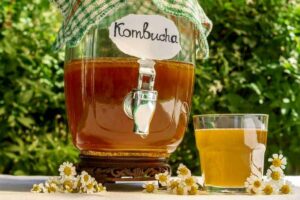
4. Alcohol
Steer clear of all alcohol, including wine, during your modified fast. Alcohol puts a big strain on your liver,5 contains plenty of calories and sugar, and gives your body an additional load of toxins to flush out of your system.
5. Diet Soda
Diet soda is zero-calorie, so it’s fine, right? Not so fast.
These drinks are filled with artificial sweeteners (including the neurotoxin aspartame). Not only do they contribute to sugar cravings, but they also load your system down with more junk to flush out and even contribute to insulin resistance and belly fat.6 Avoid this type of drink every day, but especially during a fast!
[Related: Seven Reasons Not To Drink Soda (And How To Stop The Habit)]
6. Zero-Calorie “Naturally Flavored” (or Artificially Flavored) Drinks
Like diet soda, drinks that advertise “natural flavors” might seem like a fantastic choice during a fast. But the phrase “natural flavors” can (legally, strangely enough) hide a huge number of strange ingredients that interfere with a fast.7
7. Carbonated Drinks (Yes, Even La Croix)
Okay, so what about carbonated drinks that are sweetened with Stevia or trace amounts of fruit juice (like La Croix)? While these drinks are okay in moderation outside of a fast, they do contribute to an acidic pH (carbonated water has been shown to eat away at tooth enamel!8), and the carbonation robs your red blood cells of oxygen. Steer clear!
8. Fruit Juice
Fruit juice is a no-no for several reasons. First, unless it’s cold-pressed (which preserves the nutrients and enzymes), fruit juice isn’t much better than soda in terms of sugar content. Second, fruit juice is very high in calories and is almost guaranteed to put you over your calorie goals for a modified fast.
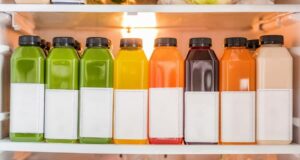
Drinks That Are 100% Allowed During a Modified Fast
Worried you’re going to miss your diet soda or your coffee too much during a modified fast?
Many people are pleasantly surprised to learn just how energized and refreshed they feel after a good night’s sleep (sans coffee or caffeinated tea!) once they've completed a modified fast.
Thankfully, you have a LOT of delicious options to tickle your tastebuds. All of the following drinks are allowed in unlimited quantities during your modified fast.
1. Spa Water
Water infused with whole fruit slices, ginger, or vegetables is refreshing, full of electrolytes, and most importantly, delicious. Try the following combinations to keep your tastebuds happy during a fast! Spa water can be kept in a refrigerated pitcher for several days at a time.
- Ginger Lemon Twist
Thickly grate a small piece of ginger, slice one lemon, and add about a quart of water. Add a small amount of Stevia if you wish!
- Berry Burst
Add a handful of blackberries, sliced strawberries, and raspberries to a pitcher of water.
- Strawberry Lime
Sliced strawberries and limes left for a few hours in a pitcher of water adds just the right amount of sweet and tart!
- Mint Julep
Add lime slices and mint leaves to a pitcher of water, along with a pinch of unrefined salt and a little stevia, for a refreshing, tart drink.
- Cucumber Water
Plain cucumber slices in water make a surprisingly delicious drink. There’s a reason it’s a staple of spas around the world!
The combinations for spa water are basically endless. Just make sure you’re using whole fruit or veggie pieces and not juicing them!
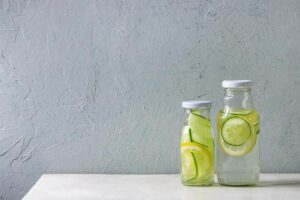
2. Lemon Water, with Optional Cayenne and Vinegar
Lemon water is low calorie, alkaline, full of electrolytes, and very refreshing. Make it by squeezing a fresh lemon into a quart of water. You can also add a couple teaspoons of vinegar and some cayenne pepper, if desired, to improve blood sugar levels and avoid hunger pangs.
3. Celery Juice or Other 100% Vegetable Juices
Organic celery juice (and other 100% vegetable juices) is very low in calories but high in electrolytes, enzymes, and nutrients. It’ll keep you hydrated, help lower inflammation in your system, and fortify your cells as you fast!
4. Herbal Tea
Herbal tea, either hot or iced, can be incredibly soothing — not to mention filled with antioxidants. Choose organic, loose-leaf brands made from whole fruit and nut pieces for the biggest bang for your antioxidants!
5. Raw Coconut Water
Coconut water is a fantastic choice for electrolytes and hydration. It’s low in calories, and it has a pleasant, mild taste that you can use as a base for spa water as well!
Will Drinks with a Small Amount of Calories (Like Lemon Water or Celery Juice) Break My Fast?
Short answer: Nope!
Longer answer: The minute number of calories in spa water, celery juice, lemon water, or herbal tea won’t take you out of a fasted state, burden your digestive system, or slow down autophagy.
In other words, if you drink a cup of celery juice during your fasting window, this won’t set the clock on your eating window. In fact, many people find that by sipping on herbal tea, celery juice, or spa water, they feel more relaxed and are able to extend their fasted state longer!
Lemon water, cayenne vinegar water, ginger water, and celery juice also have the added benefit of high alkalinity, which can help your body take advantage of a fasted state even more effectively.
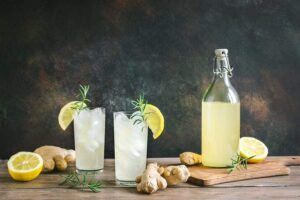
Symptoms of Dehydration and Low Electrolyte Levels While Fasting
If you start feeling shaky, weak, or lightheaded at any point during your fast, dehydration and low electrolyte levels are the most likely culprits.
If you’re drinking a lot of water and your urine is light-colored, electrolyte imbalance is probably the cause of your symptoms. You’re flushing more liquid from your body than usual, and your electrolyte levels and blood pressure can dip as a consequence. Try the following:
- Sip on celery juice, coconut water, or lemon water with ¼ teaspoon of unrefined salt added.
- Move your next Flash Fast mini-meal up in the day, and eat it slowly.
If you suspect you might not be getting enough water and your urine is medium or dark yellow, your suspicions are probably correct. Try the following to make sure you stay hydrated:
- Keep a reusable water bottle with you at all times and take sips throughout the day.
- Don’t wait for thirst to alert you that you need a drink. By the time you’re thirsty, you’re feeling the effects of dehydration.
- Invest in a larger water bottle (one quart) so you can better gauge how much water you’re actually drinking throughout the day.
TLDR: What You Can Drink During a Modified Fast
I get it: Plain water (even alkaline water!) can get a little boring. And while it should be the staple of your liquid intake during a modified fast, it doesn’t have to be your only drink! You can have unlimited quantities of celery juice, spa water infused with whole pieces of fruits and veggies, lemon water, herbal tea, and raw coconut water.
Steer clear of anything caffeinated, decaf coffee, artificially flavored drinks, carbonated drinks, diet soda, alcohol, and anything else that includes chemicals or artificial ingredients.
Drinking the right liquids (and avoiding the wrong ones) during your modified fast can make a HUGE difference in the results you see!

Disclosure: This post may contain affiliate links that help support the GSG mission without costing you extra. I recommend only companies and products that I use myself.
Resources
- Popkin BM, D'Anci KE, Rosenberg IH. Water, hydration, and health. Nutr Rev. 2010;68(8):439–458. doi:10.1111/j.1753-4887.2010.00304.x
- Riebl SK, Davy BM. The Hydration Equation: Update on Water Balance and Cognitive Performance. ACSMs Health Fit J. 2013;17(6):21–28. doi:10.1249/FIT.0b013e3182a9570f
- Mizushima N, Levine B, Cuervo AM, Klionsky DJ. Autophagy fights disease through cellular self-digestion. Nature. 2008;451(7182):1069–1075. doi:10.1038/nature06639
- Martin JV(1), Nolan B, Wagner GC, Fisher H. “Effects of dietary caffeine and alcohol on liver carbohydrate and fat metabolism in rats.” Med Sci Monit. 2004 Dec;10(12):BR455-61.
- Szabo G, Mandrekar P. Focus on: Alcohol and the liver. Alcohol Res Health. 2010;33(1-2):87–96.
- Fowler SP, Williams K, Hazuda HP. Diet soda intake is associated with long-term increases in waist circumference in a biethnic cohort of older adults: the San Antonio Longitudinal Study of Aging. J Am Geriatr Soc. 2015;63(4):708–715. doi:10.1111/jgs.13376
- Organics.org. “11 Disgusting ‘Natural’ Ingredients in Your Food.” September 19, 2018.
- Ryu HK, Kim YD, Heo SS, Kim SC. Effect of carbonated water manufactured by a soda carbonator on etched or sealed enamel. Korean J Orthod. 2018;48(1):48–56. doi:10.4041/kjod.2018.48.1.48
Posted in: Fasting


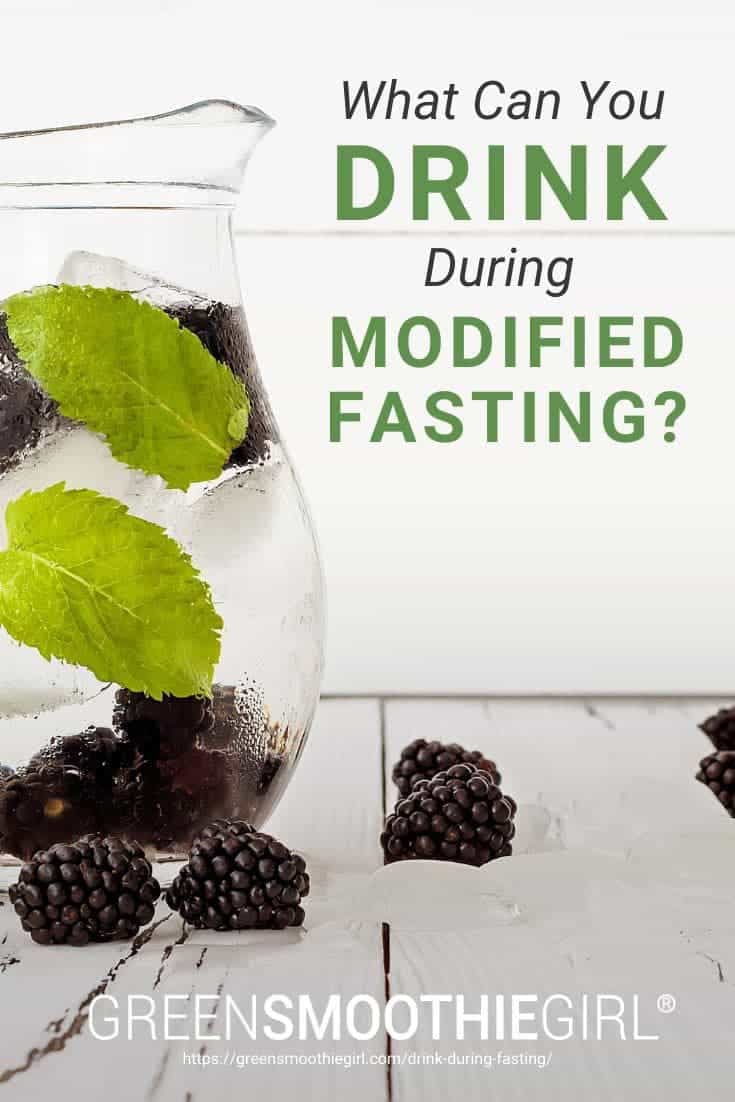









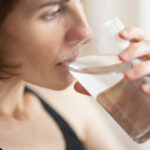



No comments found, but you can be our first!